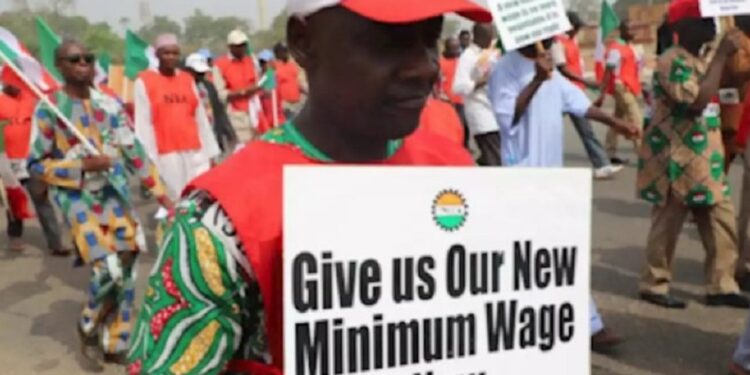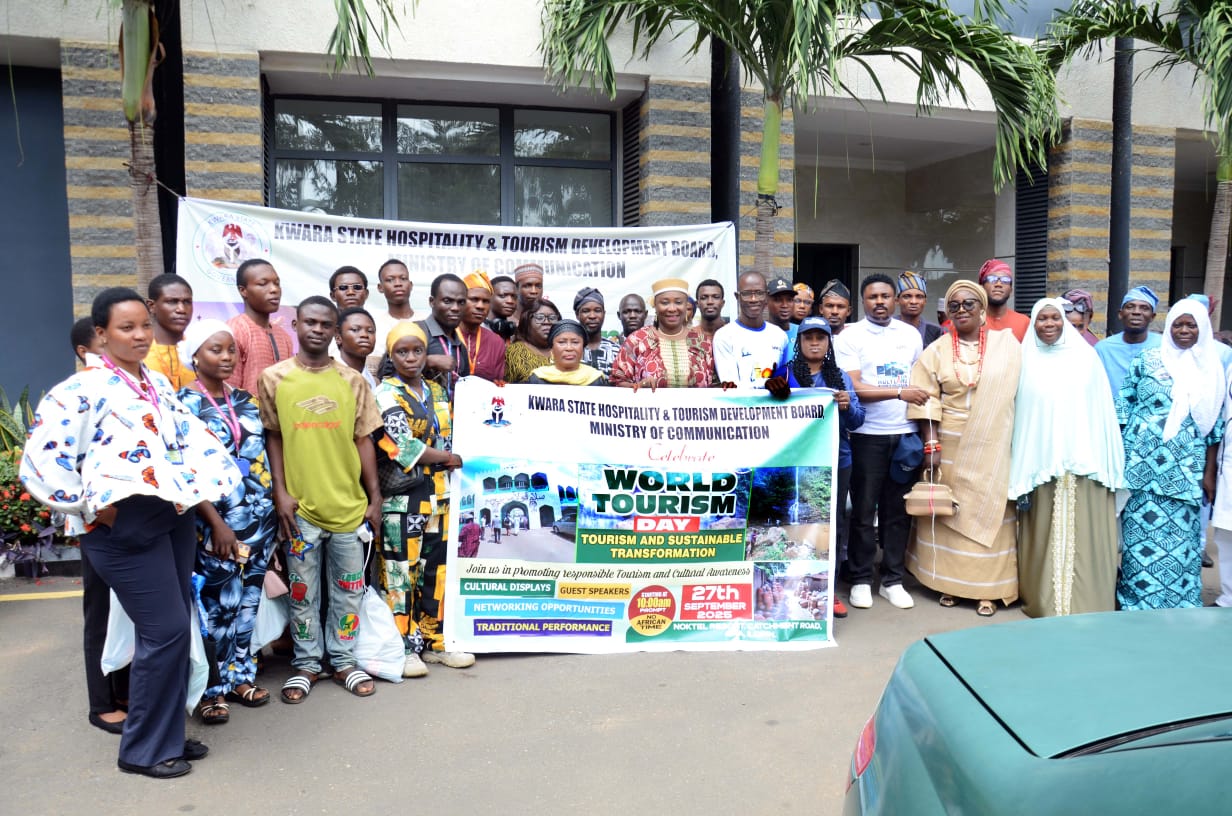Economy
NLC Demands ₦250,000 Minimum Wage, Rejects Federal Government’s ₦62,000 Proposal

By Milcah Tanimu
The Nigeria Labour Congress (NLC) has rejected the federal government’s proposal of a ₦62,000 minimum wage, insisting on a minimum of ₦250,000. Chris Onyeka, the NLC’s Assistant General Secretary, made this clear during an interview on Channels Television’s Morning Brief show on Monday.
Onyeka criticized the ₦62,000 proposal as a “starvation wage” and dismissed the suggestion of ₦100,000 from some individuals and economists as equally unacceptable. The NLC remains steadfast in its demand for a more substantial and realistic minimum wage to address the current economic challenges faced by Nigerian workers.
“We have never considered accepting ₦62,000 or any other wage that we know is below what we know can take Nigerian workers home. We will not negotiate a starvation wage. We have never contemplated ₦100,000, let alone ₦62,000. We are still at ₦250,000; that is where we are, and that is what we considered enough concession to the government and the other social partners in this particular situation. We are not just driven by frivolities but the realities of the marketplace; realities of things we buy every day: a bag of rice, yam, garri, and all of that,” Onyeka stated.
The NLC official further disclosed that should the federal government and the National Assembly fail to act on the workers’ demand by Tuesday, June 11, 2024, the organs of the Nigeria Labour Congress (NLC) and the Trade Union Congress (TUC) would meet to decide on the resumption of the nationwide industrial action relaxed last Tuesday.
Labour argued that the current ₦30,000 minimum wage is inadequate due to rising inflation and the impacts of recent policy changes, such as the removal of petrol subsidies and the unification of forex windows. They also pointed out that many governors have not been paying the current wage, which expired in April 2024.
President Bola Tinubu set up a tripartite committee in January 2024 to negotiate a new minimum wage. The labour unions’ initial demand was ₦615,000, later reduced to ₦494,000. The government and private sector’s proposals, peaking at ₦60,000, were rejected, leading to the strike.
On June 3, 2024, Secretary to the Government of the Federation, George Akume, announced the President’s commitment to a wage above ₦60,000, prompting Labour to suspend the strike on June 4, 2024, and resume negotiations. The President tasked Finance Minister Wale Edun with creating a new wage template. Despite intense discussions, no consensus was reached by June 7, 2024.
Labour reduced their demand to ₦250,000, while the federal government offered ₦62,000. Both parties have now submitted their proposals to the President, who will decide and forward an executive bill to the National Assembly for legislative approval.
Economy
NNPCL has responded to queries on unaccounted N210trillion – Senate

By Hassan Taiye
The Senate through its committee on Public Account declared Tuesday that the Nigerian National Petroleum Company ( NNPCL) , has responded to 19 queries raised against it in the Audit reports of 2017 to 2023.
The Committee had on the 29th of July this year , gave the Chief Executive Officer of NNPCL, Engineer Bayo Ojulari , three weeks to respond to the 19 queries on N210trillion yet to be accounted for, in the Audited account of National Oil Company .
Responding to questions from journalists at the close of plenary on Tuesday on whether NNPCL had responded to the queries or not , the Chairman of the Committee, Senator Aliyu Wadada ( Nasarawa West) said yes but explained that the responses were yet to be critically looked into .
He said : “While we were on recess, management of NNPCL wrote to the committee, requesting an extension of time to enable them compile data and respond comprehensively to the questions we raised — and we granted that request.
“They have since responded, and we now have answers to all 19 questions we sent to them.
“However, the report is yet to be presented before the committee. That is why, as chairman, I have refrained from making any public statement on the matter until it is properly laid before members.
“But let me assure you, as I promised earlier on behalf of the committee, we will do justice to the matter”.
He added that beyond the audited financial statements, there are other issues emerging around the NNPC.
According to him, the first of such issues is production sharing contracts — specifically, the production cost to Nigeria which must be clearly defined, and the public deserves to know what portion goes to the NNPC, what goes to the international oil companies (IOCs), and what accrues to the government under the production sharing arrangement.
“Furthermore, the committee has been informed that NNPC Retail has declared a loss.
“This development is also of concern to us and to the public. We find it difficult to understand why NNPC Retail should record a loss, but we will seek clarification when the corporation appears before us.
“As far as the audited financial statements are concerned — which cover the period between 2017 and 2023 — NNPC has submitted its responses to the 19 questions we asked. Nigerians and the media will be informed of the contents in due course.
“Out of those answers, the ones that make sense and those that do not will be evident to the public”, he stressed .
Economy
Nigerians to Pay More for Petrol as Fuel Prices Rise Nationwide

By: Fabian Apechihin
Nigerians are facing yet another spike in fuel prices as premium motor spirit (petrol) now sells for between ₦905 and ₦945 per litre across several filling stations in Abuja.
Checks on Monday, October 6, 2025, revealed that Nigerian National Petroleum Company Limited (NNPCL) retail outlets, along with Empire, AA Rano, and Shema filling stations, adjusted their pump prices upwards. Empire Filling Station in Gwarimpa reportedly sold petrol at the highest rate of ₦945 per litre.
Other stations, including MRS, Emedeb, Ranoil, and Eterna, dispensed petrol between ₦885 and ₦910 per litre.
Marketers Blame PENGASSAN Strike for Price Surge
The Independent Petroleum Marketers Association of Nigeria (IPMAN) attributed the sudden hike to disruptions caused by last week’s strike by the Petroleum and Natural Gas Senior Staff Association of Nigeria (PENGASSAN).
IPMAN President, Abubakar Maigandi, explained that the price increase was largely due to supply interruptions. He noted that stations receiving supplies from Dangote Refinery were still selling between ₦885 and ₦895 per litre, adding that prices were expected to stabilize soon.
“The feud between Dangote Refinery and PENGASSAN may have triggered panic buying and artificial scarcity. I can assure you that prices will drop and return to normal in the coming days,” Maigandi said.
IPMAN spokesperson Chinedu Ukadike also confirmed that the PENGASSAN strike caused temporary shortages in Lagos and Abuja but expressed optimism that availability would improve as supply chains normalize.
Depot Prices Edge Up
Depot prices have reportedly risen slightly, with Dangote Refinery selling petrol at ₦844 per litre, Ranoil and Aiteo at ₦845, and NIPCO at ₦850 in Lagos.
The fuel price increase comes just days after Dangote Refinery and PENGASSAN resolved their dispute over the alleged mass dismissal of Nigerian workers, which led to a two-day strike. Federal Government intervention helped broker peace between both parties.
Dangote Refinery later thanked President Bola Ahmed Tinubu and other mediators for their role in ending the strike.
Shettima, PENGASSAN Trade Words
Meanwhile, Vice President Kashim Shettima, speaking at the 31st Nigerian Economic Summit (NES31) on Monday, criticized PENGASSAN, declaring that “Nigeria is bigger than the union.”
In response, PENGASSAN President Festus Osifo countered, saying the country is also “bigger than Dangote Refinery and the presidency,” emphasizing the union’s commitment to protecting Nigerian workers’ rights.
Economy
Tourism wearing a new face in Kwara: Commissioner

- Urges Kwarans, foreigners to embrace it Stephen Olufemi Oni, Ilorin
Kwara State Government has continued to showcase the beauty of culture and traditional assets and its uniqueness in the daily lives of the citizens, urging the people to embrace it for development.
The State Commissioner for Communications, Hon. Bolanle Olukoju, had earlier in a broadcast, enjoined the people of the State, at home and in the diaspora, to embrace tourism as a tool for developmental progress to sustain transformational growth in line with the policy thrust of Mallam AbdulRahman AbdulRazaq’s-led administration.
The Commissioner made the call to mark the 2025 World Tourism day with the theme, ‘Tourism and Sustainable Transformation’, as declared by the United Nation’s World Tourism Organization(UNWTO).
According to Olukoju, tourism is more than travel, it is actually a way of supporting people, culture, and the environment while driving economic growth, urging all and sundry to explore the various tourist sites around them.
“Tourism is not just travel, it is about building a future where every journey contributes to people, culture and planet, it is about hospitality that opens our heart and also helps to preserve our heritage and create opportunities for growth and development”, She said.
The Commissioner, who was delighted that the Ilorin Emirate Durbar was recently ranked among the top ten festivals in Nigeria, celebrated Hajia Faridah Shagaya, who was recognised among Africa’s top tourism personalities, describing the recognitions as sources of pride for the state.
She commended the administration of Governor AbdulRazaq for investing in tourism and hospitality, citing projects such as the Visual Arts Centre, Flower Garden, and Sugar Factory Film Studios, among others, as commendable efforts.
She also announced that this year’s celebration includes a roundtable with stakeholders to advance discussions on the future of tourism in Kwara State.
“Tourism is wearing a new face, from the Sugar Factory Film Studio, the Visual Arts Centre and the improved road network to Owu Waterfalls and many more which are evident of his work and is gradually opening Kwara to the World”, she added.
The Commissioner, who was represented at the event by the Director, Personnel, Finance and Supply, Hajia Salamat Yahaya, assured that tourism will continue to receive priority attention under the present administration and urged all stakeholders to support the ongoing efforts to make Kwara a leading destination for culture, heritage, and hospitality.
In her remarks, the Secretary, kwara State Hospitality and Tourism Development Board, Hajia Ramat Akanni, applauded the present administration for priority attention given to the Board.
Hajia Akanni expressed optimism towards an enviable tourism and hospitality driven state, which she assured, would attract prospective investors and enhance revenue generation for the state.
She sought support and utmost compliance from hoteliers and relevant stakeholders to achieve the desired goals, pointing out that violators will face the full wrath of the law.
Relevant stakeholders and participants at the one-day event later visited Sobi Hills and the Kwara Sugar Film Factory as part of activities marking the celebration.
End
-

 Uncategorized5 years ago
Uncategorized5 years agoFG, states urged to harness flooding for ranching, others with technology – Agbaje
-

 Headlines10 years ago
Headlines10 years agoBreaking: EFCC seals Borno House of Assembly, as Hon members take to their heels
-

 News11 years ago
News11 years agoNigeria Security Operatives Stage Manhunt For Homosexual Perpetrator
-

 News9 years ago
News9 years agoHow 21-year-old Girl fled community over accusation of lesbianism
-

 News10 years ago
News10 years agoYobe Gov Moves Against Deputy
-

 Opinion6 years ago
Opinion6 years ago7 signs she has friend zoned you
-
Technology4 years ago
Online job placement company headhunts women
-

 Headlines9 years ago
Headlines9 years agoBorno Dep Gov Abducts Another Church Leader





